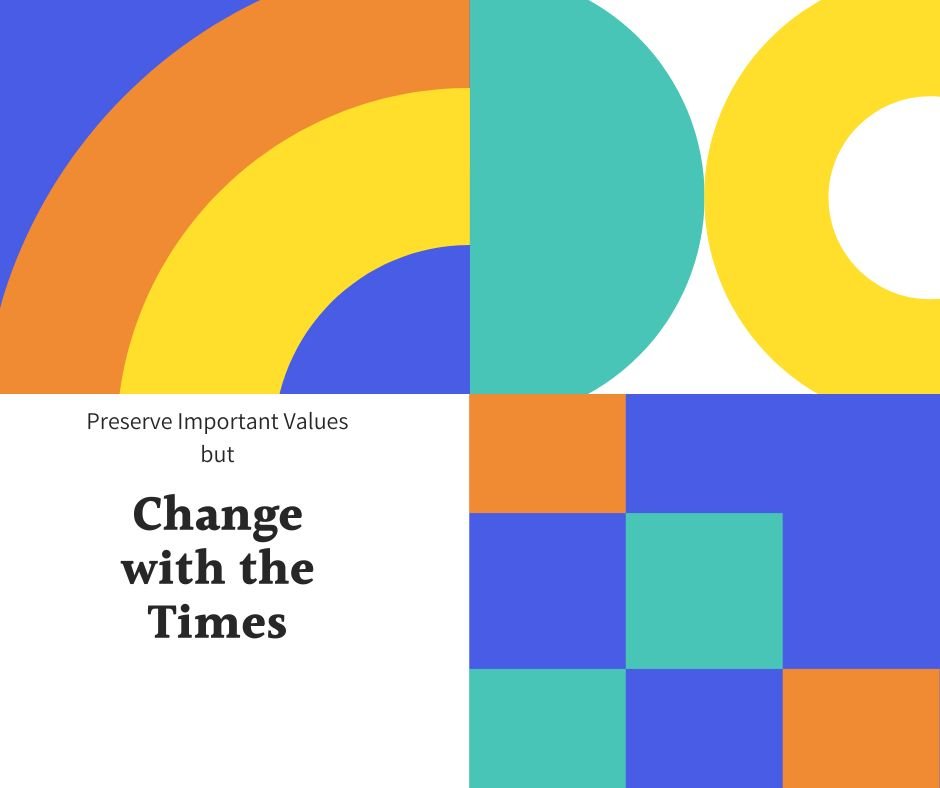Changing with the Times
Changing with the Times
Everyday we are faced with news reports of significant changes in the world – floods and fires, political coups and war, technological breakthroughs and failures. Does anything stay the same? Most of us value routine, tradition and consistency in at least a portion of our lives, but that gets harder and harder to maintain. Change is all around us and we can decide to resist it or adapt or perhaps do a little of both. What doesn’t change? There are values that persevere and help us deal with change. Those values also contribute to the quality of our lives, including health and longevity.
There have been many news reports about declining life expectancies in the United States. As of April of 2023, American life expectancy had declined to 76.4 years, the shortest it had been in two decades. Compared to other countries, the statistics seem even worse. In 1933 the U.S. life expectancy was reported to be 8th in the world. In 2020, we ranked 46th, 7.8 years behind Hong Kong. In a country which claims to be filled with innovators, outstanding universities and a high quality of life, something appears to be missing.
I am involved in two organizations which are important to me and take up a lot of my time. One is my church and the other is my “women’s group.” I use those quotations because, in an effort to adapt to the times, the American Association of University Women changed its bylaws several years ago to welcome both male and female members. I supported that change, but it hasn’t had much effect on the actual membership of the organization. In fact, one of the reasons for allowing men to join, was an attempt to establish some equivalency with the traditional men’s clubs, which were being pressured to allow women as members. Women are now actively part of the Rotary and Kiwanis and many other formerly male-only groups, but the men haven’t flocked to AAUW. Could it be that the women aren’t perceived to have the same level of wealth and power as the men?
In our changing world, traditional organizations such as my church and my women’s group have been struggling to maintain their membership, as well as their facilities. On my recent trip to Iceland I was surprised to learn that their government supports their churches with tax money. That support helped explain how they could have so many beautiful churches located even in small towns, all of them seemingly well maintained. A part of me wished that support was available in the U.S. but as quick as the idea came into my head, I realized that was not going to happen for many different reasons. For example, in Iceland, the churches are nearly all the same denomination, and most of the population claims to be part of that denomination, although that may change with immigration.
At times, I think that AAUW as an organization has outlived its purpose. It was founded in 1881 as a means of encouraging the small number of women who graduated from college to support one another, advance in their careers, and work toward greater opportunities for all women and girls. Those goals are still relevant in today’s world, but there is much more competition for the use of women’s time, so membership numbers decline.
AAUW members are now faced with an important challenge. From the beginning, membership in the organization required a college degree from an accredited institution. There have been many attempts to change that requirement. Currently, both 2-year and 4-year degrees are accepted and there is a special student membership. However, there will soon be a vote on eliminating the degree requirement altogether. In my opinion, it’s important for this change to pass. Along with many other institutions around the world, AAUW needs to adapt to the times. As strong advocates for equity for all people, AAUW should not be discriminating against potential members based on their level of education. We need this change to pass so that we can adjust our recruitment and activities to better fit today’s world.
Changes are occurring within the church as well. Some churches have down-sized their facilities, merged with other congregations, or transformed themselves into community centers, supporting a variety of organizations. It’s not clear yet what direction my church will pursue but I agree that we need to consider changes that might help us adapt with the times.
What are those enduring values that can help us adjust to a changing world? I’ve been reading about what contributes to longevity and happiness. We are all familiar with the advice to avoid smoking, maintain a healthy weight, get exercise, and have a healthy diet. There’s other advice which I see as relevant to my church and AAUW involvement. A report from the National Institute of Health includes these items, among others, in its advice for staying healthy:
n Be good to yourself. Get enough sleep. Stay in touch with family and friends. And surround yourself with people you enjoy.
n Keep your brain active.
Another NIH post describes what it means to “Keep your brain active.” Suggestions include volunteering, hobbies, learning new skills, creative activities such as music, theater or dance, reading, playing games, etc.
Author Dan Buettner has made a career of exploring Secrets of a Long Life. He has identified what he describes as “blue zones” in various parts of the world where residents live longer lives than in most other places. He then analyzes what factors may contribute to their health and happiness. NPR recently did a show which summarized some of Buettner’s conclusions. His recommendations include:
n Give loneliness the boot – become a joiner.
n Revamp social media to cultivate friends and a sense of purpose.
n Trade big-city rents for an affordable home (and maybe keep your parent nearby)
The Guardian interviewed long-lived seniors to get their recommendations: they suggested that close personal relationships were more important than fame, success, social class, IQ, genes or income. They also suggested exercising optimism, empathy, delayed gratification, continued learning and seeking out the funny side of life.
The advice from the Guardian and Dan Buettner help explain why my church and AAUW group, despite declining membership and changing times, are still important to me. They provide lifelong learning, friendships and a sense of purpose. These values will remain important no matter what other changes occur.
Send personal comments or add your name to our mailing list using the form below. No advertising. No use of your information for other purposes.

